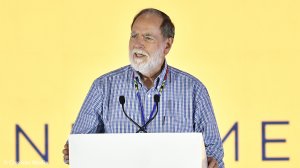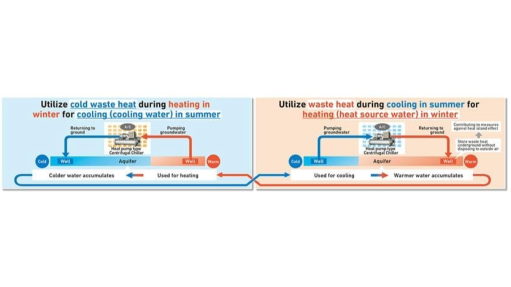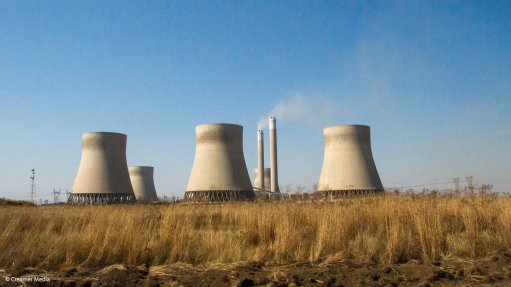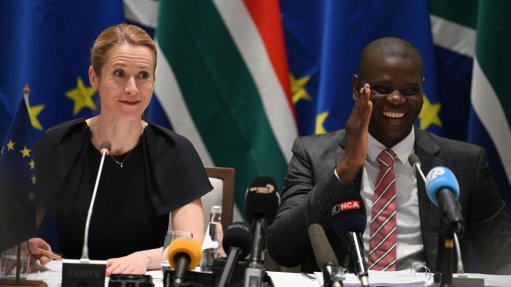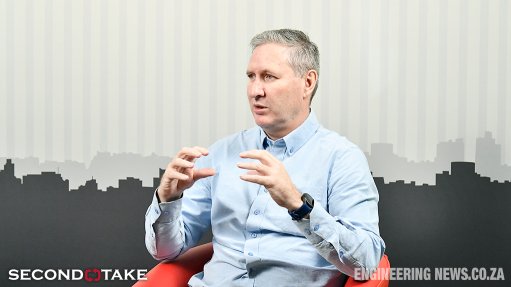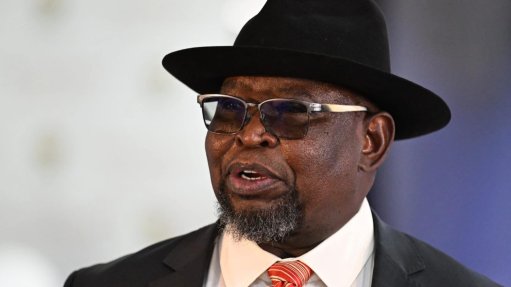If business-as-usual approach to conservation continues, world’s doomed – Oppenheimer conference hears

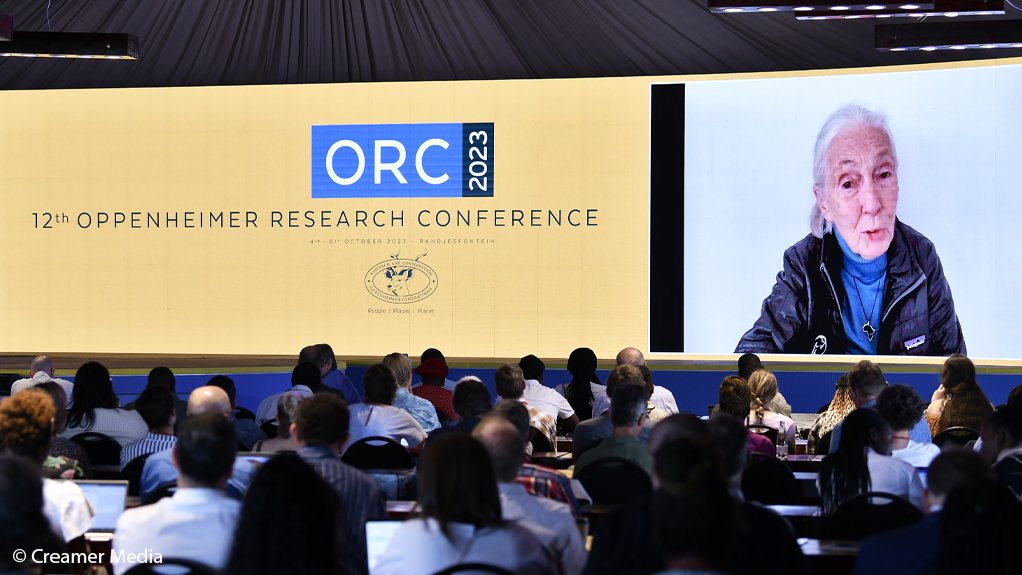
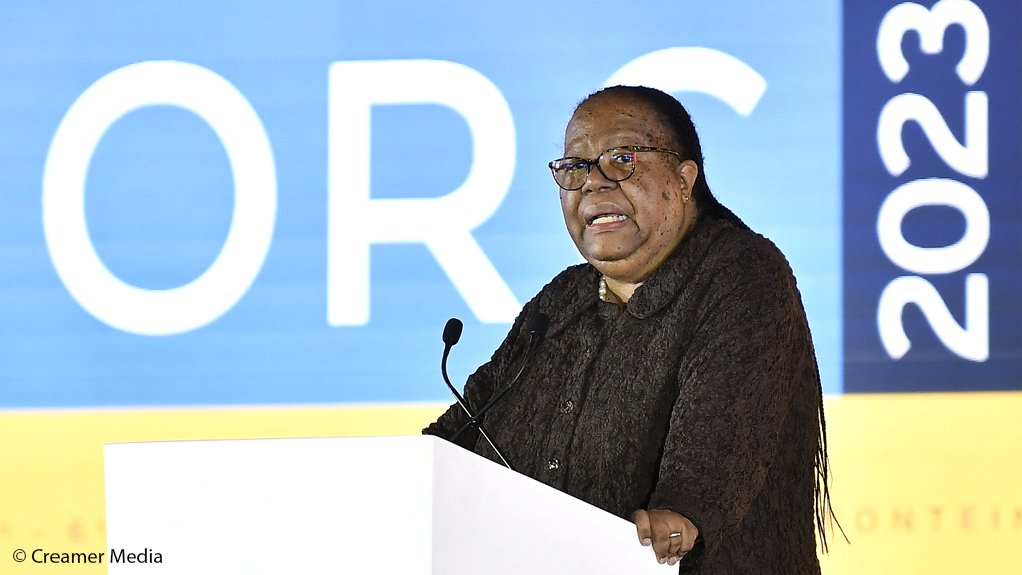
Oppenheimer Research Conference covered by Mining Weekly’s Martin Creamer. Video: Shadwyn Dickinson. Photographs: Donna Slater
World-renowned conservationist Jane Goodall.
Photo by Creamer Media Chief Photographer Donna Slater
International Relations Minister Naledi Pandor.
Photo by Creamer Media Chief Photographer Donna Slater
World-renowned conservationist Jane Goodall reminded hundreds of scientists present at the twelfth Oppenheimer Research Conference in Midrand that if the world carries on with a business-as-usual approach to conservation, the planet is doomed.
“Forests, wetlands, peatlands, grasslands, all of which store carbon dioxide from the atmosphere, are being destroyed, and habitats lost or fragmented,” Goodall told the conference covered by Engineering News & Mining Weekly.
“Humanity is standing at the precipice. Given the crisis of climate change as well as the loss of biodiversity and escalating pollution, our environment is being destroyed and this threatens the sustainability of our planet,” International Relations and Cooperation Minister Naledi Pandor commented.
Oppenheimer Generations chairperson and former De Beers and Anglo American mining luminary Nicky Oppenheimer emphasised the need for a new way forward to be found amid these sobering clarion calls.
It would appear from this year’s G20 meeting that the world is going to see beyond $80-billion made available for responses to climate change.
“So, we’re coming close to that $100-billion target, yet it’s not a sufficient response to what we need to do. All our ambitious targets will be meaningless if they’re not backed with enabling means of implementation, particularly for developing countries and more especially for mega-diverse developing countries such as ours,” said Pandor.
Strong pleas were made for the world to take on the global climate crisis in tandem with science.
“Progress is being made in many countries but we can’t afford to be complacent. We need to do much more. We need to collaborate and form partnerships so that together we can be even more effective in creating positive change,” added Goodall.
“Despite the huge amounts of money being thrown into conservation, the relationship between humankind and nature, in my view, is broken and my hope is out of this conference will come the beginning of a new answer,” said Oppenheimer.
Pandor spoke of the South African government confronting the policy questions related to the conservation domain.
“We’re working hard at finalising the Draft White Paper on the conservation and sustainable use of South Africa’s biodiversity. We’re very worried that our biodiversity is threatened not just by climate change but by habitat loss, invasive alien species, over-harvesting and illegal harvesting.
“We must take action that will secure ecological sustainability into the future and promote justifiable economic and social development to reduce poverty, inequality and unemployment, particularly for our rural communities,” said Pandor.
Over the dozen years of the conference, there has been a clear nexus between community development, sustainable responses, and action on research in the conservation area.
“As we address matters of sustainability, if we can find a way of addressing these triple challenges of poverty, inequality and unemployment simultaneously, it will be a significant contribution to world development,” said Pandor.
The Draft White Paper, she added, emphasised the need for targeted research to address knowledge gaps and rapid biodiversity assessments.
“The White Paper gives emphasis to the importance of research and partnerships that highlight the value of indigenous and traditional knowledge and practices, providing localised solutions to biodiversity conservation.
“I’m really thrilled that the White Paper has recognised that science should inform policy and I think this is a very important inclusion,” said the former Science and Technology Minister.
South Africa’s foreign policy approach at the United Nations Framework Convention on Climate Change and as a signatory to ensuing Multilateral Environment Agreements is that solutions to share the challenges should be collective, based on equity and involve the best available science.
“We locate climate and environment action in the context of Just Transitions and sustainable development, holding that we should leave no one behind. This is because we believe sustainable and acceptable environmental solutions for the planet and our country should be linked to people-centred development and the social and economic pillars of sustainable development.
“We believe all peoples have a right to development and a right to live in a clean and healthy environment and this is what we table when we participate internationally. As South Africa, we recognise that even our foreign policy perspectives have to be informed by scientific inputs that draw on a range of multidisciplinary scientific fields of research. We draw on physical sciences, human sciences as well as other science forms in order to develop scientific policy proposals and products, which are accessible and useable at the policy level.
“We do believe that we must address the funding issue and other challenges that would help us to unlock the full potential of our scientific community. We also need to ensure that we develop scientific products to assist us in determining policy and practice.
“At the policy level, when we are faced with the daunting and seemingly impossible task of addressing an inter-linked and long-term crisis, we need short-term and more targeted products to help spur immediate action.
“We have policymakers in South Africa who are ready to listen to science and to draw on science for solutions,” said Pandor.
The awarding of the $150 000 Jennifer Ward Oppenheimer Research Grant to support an African-led environmental research programme at this conference was described by Pandor as a tangible way of encouraging environmental research on issues that affect Africa and the globe.
Comments
Press Office
Announcements
What's On
Subscribe to improve your user experience...
Option 1 (equivalent of R125 a month):
Receive a weekly copy of Creamer Media's Engineering News & Mining Weekly magazine
(print copy for those in South Africa and e-magazine for those outside of South Africa)
Receive daily email newsletters
Access to full search results
Access archive of magazine back copies
Access to Projects in Progress
Access to ONE Research Report of your choice in PDF format
Option 2 (equivalent of R375 a month):
All benefits from Option 1
PLUS
Access to Creamer Media's Research Channel Africa for ALL Research Reports, in PDF format, on various industrial and mining sectors
including Electricity; Water; Energy Transition; Hydrogen; Roads, Rail and Ports; Coal; Gold; Platinum; Battery Metals; etc.
Already a subscriber?
Forgotten your password?
Receive weekly copy of Creamer Media's Engineering News & Mining Weekly magazine (print copy for those in South Africa and e-magazine for those outside of South Africa)
➕
Recieve daily email newsletters
➕
Access to full search results
➕
Access archive of magazine back copies
➕
Access to Projects in Progress
➕
Access to ONE Research Report of your choice in PDF format
RESEARCH CHANNEL AFRICA
R4500 (equivalent of R375 a month)
SUBSCRIBEAll benefits from Option 1
➕
Access to Creamer Media's Research Channel Africa for ALL Research Reports on various industrial and mining sectors, in PDF format, including on:
Electricity
➕
Water
➕
Energy Transition
➕
Hydrogen
➕
Roads, Rail and Ports
➕
Coal
➕
Gold
➕
Platinum
➕
Battery Metals
➕
etc.
Receive all benefits from Option 1 or Option 2 delivered to numerous people at your company
➕
Multiple User names and Passwords for simultaneous log-ins
➕
Intranet integration access to all in your organisation


